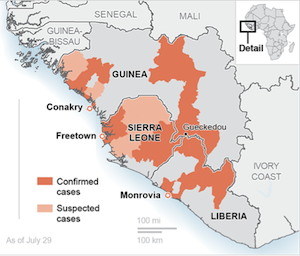FREETOWN, Sierra Leone -- It seemed as if the Ebola crisis were abating.
New cases were plummeting. Sierra Leone's president eased travel restrictions, and schools were to reopen. A local politician announced on the radio that two 21-day incubation cycles had passed with no new infections in his Freetown neighborhood. The country, many health officials said, was "on the road to zero."
Then, Ebola washed in from the sea.
Sick fishermen went ashore in early February to the packed, wharf-side slums that surround the country's fanciest hotels, which were filled with international medical aid workers. Volunteers fanned out to contain the outbreak, but the virus jumped quarantine lines and cascaded into the countryside, bringing dozens of new infections and deaths.
"We worked so hard," said Emmanuel Conteh, an Ebola response coordinator in one rural district. "It is a shame to all of us."
Public health experts preparing for an international conference on Ebola on Tuesday seem to have no doubt that the disease can be vanquished in the West African countries ravaged by it in the past year. But the steep downward trajectory of new cases, evident late last year and into January, did not lead to the end of the epidemic.
In Sierra Leone, the country hit hardest, the decline leveled off in late January, and the country has reported between 60 and 80 new cases every week since then. Guinea has experienced months of lower-level spread. Even in Liberia, where only a handful of treatment beds remain occupied, responders lament that a health care worker who recently became ill might have exposed dozens of colleagues and patients and that a knife fight had exposed gang members to the blood of a man who tested positive for Ebola.
"I doubt it will stop just suddenly," said Dr. Pierre Rollin, an infectious-disease expert at the U.S. Centers for Disease Control and Prevention. "It's always bumpy, and the bigger the outbreak, the more chance you have a bumpy thing."
As large epidemics taper off, it is common to find new complications in the effort to reach zero cases. "Oftentimes, we find surprises when we get to a low level that were hidden by the epidemic itself early on," said Dr. William Foege, a former director of the CDC and a leading figure in the eradication of smallpox.
For example, health officials managed to reduce measles dramatically in United States in the 1970s, but it took some time before experts realized that a few travelers per week arriving from other countries routinely arrived with the illness, continuing its spread. Importation of measles is again a problem today, and it is suspected as a factor in the current outbreak linked to Disneyland.
That challenge is apparent now in Sierra Leone, where the arrival of infected mariners -- combined with a recent easing of anti-Ebola measures, persistent community resistance to containment measures and misunderstanding -- has contributed to the surge in the capital.
Two wooden boats carrying three sick fishermen arrived at a small wharf in Freetown in early February, cutting short a two-week trip. "The captain was throwing up," said Mohamed Bangura, 23, a crew member of one boat.
The wharf, Tamba Kula, is an informal settlement where hundreds of people live in shanties made of reclaimed wood and corrugated metal roofs. Those who contracted Ebola there and nearby -- two dozen people since early February -- include fishermen, boat cleaners and two women who sold fish.
There are various theories about how the seamen might have been infected and how they spread Ebola to others. Some mariners delayed reporting their illnesses, stopping instead at an island for treatment with native herbs before going home to the capital. A few wharf residents who later fell ill thought they had come into contact with contaminated bodily fluids at a shared toilet block that was recently built in Tamba Kula by the aid group Oxfam.
When the cluster developed at the wharf area -- part of a large neighborhood known as Aberdeen with thousands of residents -- some Ebola prevention workers were taken by surprise because they had been continuing surveillance efforts. Officials imposed a quarantine, prompting many fishermen to take to the sea to avoid it. The authorities sent out word for them to return.
On a recent afternoon, James Bangura, an official leading the Ebola response in the capital, chastised the deputy harbor master of Tamba Kula for failing to keep arriving fisherman on their boats to be evaluated.
"Once they're lost and nobody accounts for them, we can't get to zero," Bangura told the man.
Outreach teams in recent days made their way over twisting dirt paths along seaside settlements in Aberdeen, where narrow passages made it impossible to avoid physical contact with other people. The volunteers stopped at dozens of residences. "Nobody sick?" they asked in Creole. "You aren't hiding anybody?"
Foday Kamara, a community monitor, said he has spent hours with soldiers chasing down a dozen or so residents who had tried to escape quarantine in the dark. They said that they felt cooped up and that food did not always arrive. "Ebola work is not easy," Kamara said. "I feel like these people, they aren't ready to end Ebola yet."
A Section on 03/01/2015
